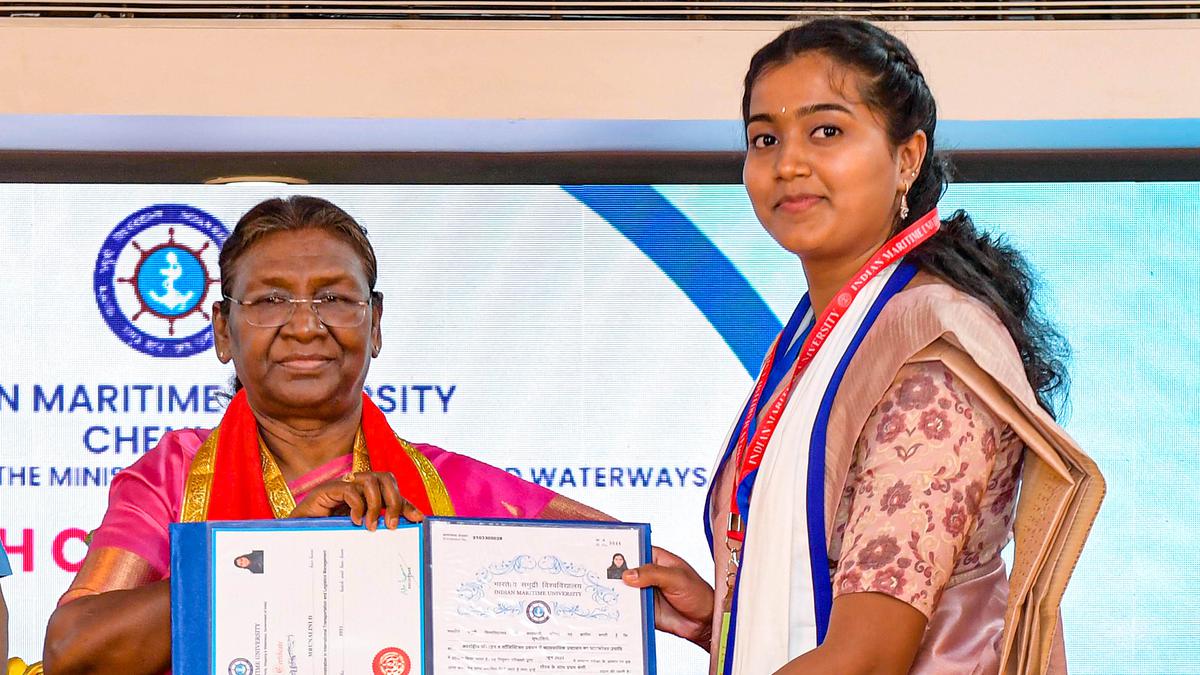
President Droupadi Murmu calls for operational efficiency of Indian ports
The Hindu
President Murmu urged Indian maritime sector to address infrastructural and operational challenges to exploit potential. Sagarmala programme is a move towards port-led development. India is now preparing for 'Samudrayaan' mission to explore deep ocean waters. Climate change is a grave challenge, maritime sector must be agile in adaptation and mitigation. IMU convocation saw 1,944 candidates receive degrees.
As a lot of container ship cargo was being diverted to nearby foreign ports due to depth restrictions at Indian ports, President Droupadi Murmu on Friday, called for efficiency in the merchant and civilian shipbuilding industries and for operational efficiency and turnaround times, at Indian ports.
Delivering her address for the eighth convocation of the Indian Maritime University (IMU) in Chennai, the President said before the country could completely exploit the potential of the maritime sector, it would have to overcome several challenges. The operational efficiency of Indian ports needed to match global average benchmarks.
“India does not figure in the top 20 nations when it comes to the annual port calls. In the list of 50 best container ports worldwide, we only have two. The Indian ports must address infrastructural and operational challenges before they graduate to the next level. The majority of our fishing fleet is yet to be mechanised,” she said.
In this context, the Sagarmala programme was a significant move away from port development to port-led development, she pointed out. The five pillars of Sagarmala were port modernisation, port connectivity, port-led industrialisation, coastal community development, and coastal shipping or inland water transportation, she said.
“India and Indians are not just managing shipping companies, global ports and hubs and operating ships, but [are] also are steering and driving the global economy,” she said.
Following the successful landing of Chandrayaan-3 on the moon’s south pole, India was now preparing for the ‘Samudrayaan’ mission to explore 6,000-metre deep ocean waters and to study deep sea resources and biodiversity assessment, she said.
One of the “gravest challenges of our time” was climate catastrophe, which included rising temperatures and sea levels, she said, and pointed out that the maritime sector needed to be agile, proactive and swift in the adaptation and mitigation of climate change factors, which risked disrupting livelihoods, particularly among vulnerable communities.

KFDC Chairman Basavaraju Neelappa Shivannavar formally handed over the land to Environment Minister Eshwar Khandre, who said a huge biological park would be developed on that piece of land in the coming days. Mr. Khandre said that the proposed park would be a much-needed green space for north Bengaluru once developed.

 Run 3 Space | Play Space Running Game
Run 3 Space | Play Space Running Game Traffic Jam 3D | Online Racing Game
Traffic Jam 3D | Online Racing Game Duck Hunt | Play Old Classic Game
Duck Hunt | Play Old Classic Game










